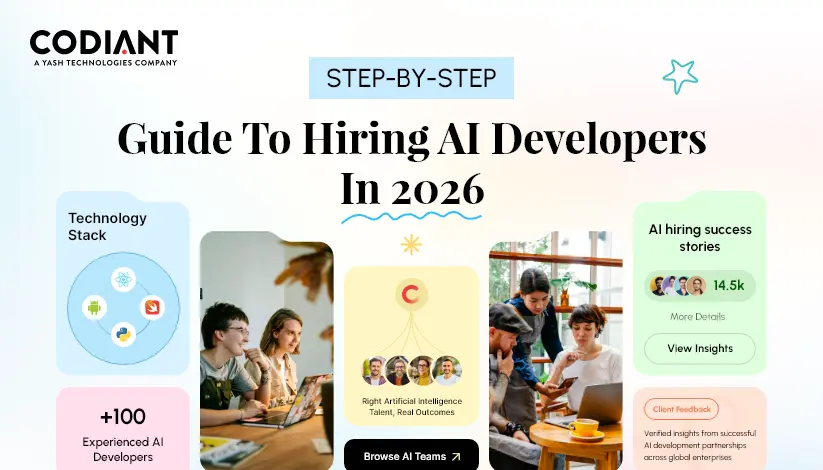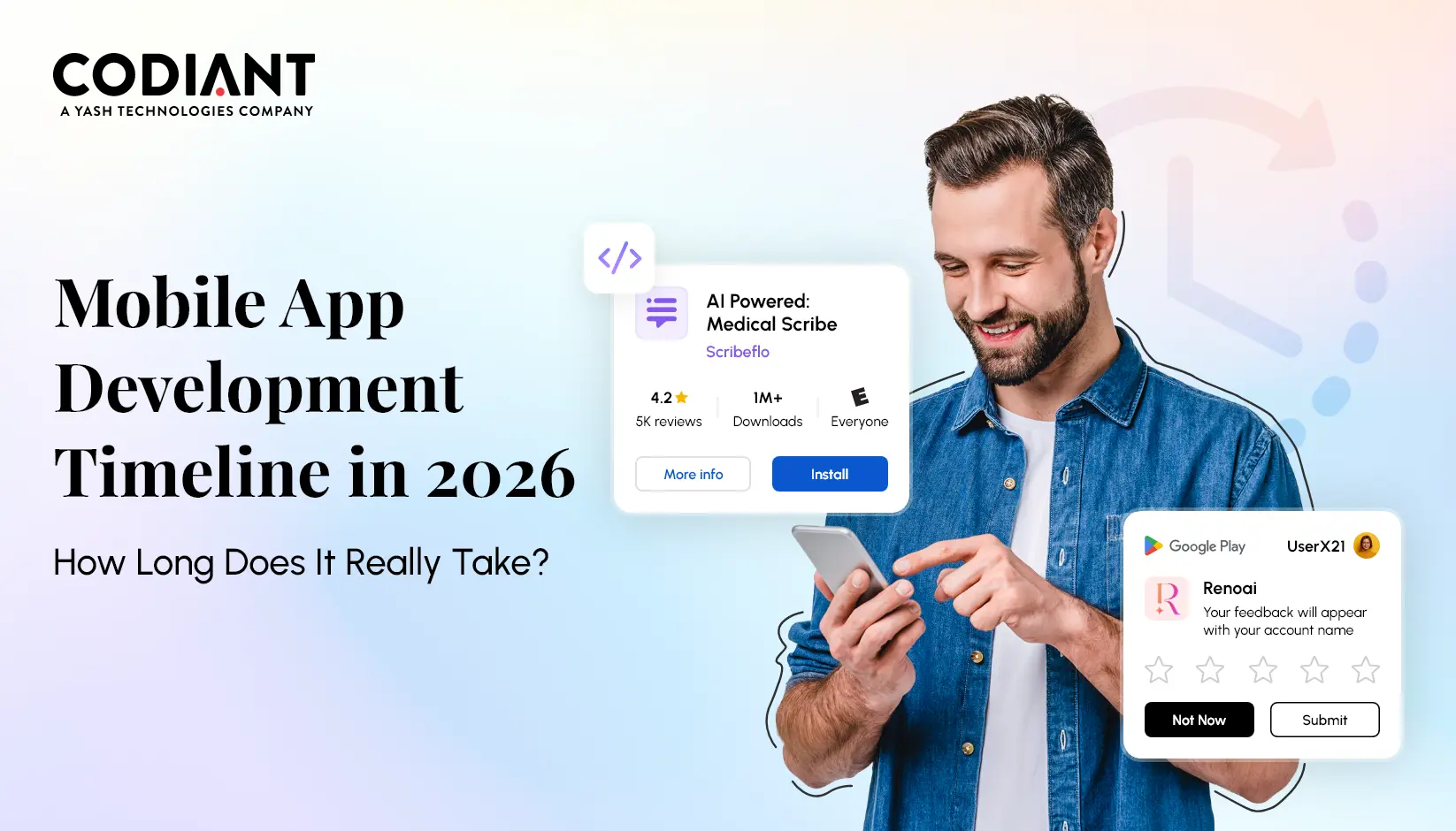10 Best Web Application Development Framework
Table of Contents
Subscribe To Our Newsletter

Web development frameworks are escalating with the rising demand and complexities of web applications. Picking the right web application framework is no longer a matter of choice but a requirement of the project’s nature.
The key performance indicators of any web server are gauged on behalf of scalability, latency, and output. The best web frameworks that give high throughput and achieve low latency are celebrated in the development environment. In this post, we will discuss some of the robust front-end and back-end frameworks that can give your project a needed boost.
Backend Frameworks
Node JS
A quintessential customizable and scalable technology- Node.js has exceptionally high performance and this open-source web development framework lets you effortlessly develop fast and scalable web applications.
Several brands that have used these Node JS services, some of them being LinkedIn, Uber, Trello, PayPal, Medium, Trello, eBay, and NASA.
Benefits of Node.js Development
- High Performance
- Easy Scalability
- Large And Active Community Support
- Easy To Learn
- Huge Number Of Free Tools
- Code Sharing And Reusability
- Better Speed
- Cost-Effective
Express JS
Express.js is a widely used node.js framework that is used for building the backend of a web application. It is easy to learn the language as it requires only JavaScript to build web applications effortlessly. What makes this technology exclusive is its support for real-time web applications as real-time web apps involve thousands of users making live interactions at a time, this feature is easily supported by Express.js. This web framework is used by several famous brands such as PayPal, IBM, GoDaddy, Walmart, Fox Sports, etc.
Benefits of Express.js Development
- Easy to configure and customize
- Scales application quickly
- Less developer cost
- Community support
- Supports caching
Django
Django is a robust yet simple MVT web framework with clean, efficient, and powerful code that is used to build web applications. Also known as “batteries included”, Django web development supports the MVC programming paradigm with robust security features. Implemented in Python this technology is designed to help web developers make an application as fast as possible. Popular websites and apps built on Django are Instagram, YouTube, Google, and even NASA.
Benefits of Django Development
- Load balancing
- Beginner-friendly
- Highly customizable
- Best Security Features
- Robust built-in template system
- Immensely scalable
- SEO- friendly
- Rich ecosystem
Ruby On Rails (ROR)
Ruby on Rails is an open-source web application framework that helps you build simple to complex applications. It has a great ecosystem where you can find all the tools and support needed. Some popular apps built on Ruby are Github, Shopify, Ask.fm, Kickstarter, Instacart, Zendesk, and SoundCloud.
Benefits of Rails Development
- Time-efficient
- Bug-free development
- Highly secured
- Flexibility
- Consistent
- Cost-effective
- Highly expressive
- Easy to manage changes
- Large community support
Laravel
Laravel is a free, open-source PHP web application framework that includes numerous characteristics of robust technologies like ASP.NET MVC, CodeIgniter, Ruby on Rails, and more. Trusted by skilled PHP programmers, Laravel offers a powerful and feature-rich ecosystem designed to simplify modern web development. With its built-in tools, robust security features, and an extensive library of packages and extensions, it enables developers to build scalable and high-performance web applications effortlessly. A skilled Laravel developer can leverage these capabilities to create customized digital solutions that meet diverse business needs while ensuring clean, maintainable code and faster project delivery.
Benefits of Laravel Development
- Cost-effective
- Enhanced performance
- Open source and powerful community
- MVC architecture
- Dependency injection
- Reverse routing
- Agile development
Frontend Javascript Frameworks
Angular
Angular JS is a front-end framework that specializes in building Single-Page applications. Supported by Google, it is used to build beautiful front-end user interfaces that are dynamic single-page applications. Web Apps like Gmail, YouTube TV, Mixer, The Guardian, Udacity, and PayPal are few popular brands using Angular.
Benefits of Angular JS Development
- Two-way data binding
- Dependency Injection
- Community Support
- Directives
- Community
- Component-based architecture
- High Performance
React
React JS turns out to be quite a useful open-source, front-end Javascript library for creating interactive UI components and building user interfaces. Maintained by Facebook, React JS is an easy-to-use and fast-developing tool that is designed to achieve fast performance. It is used by some of the market-leading companies, like Apple, Netflix, and PayPal with over 32 thousand websites built using React JS framework.
Benefits of React JS Development
- Boost productivity
- Fast, responsive, and user-friendly
- SEO friendly
- Focused and easy to learn
- Strong community support
- Provides code stability and smooth performance
- Best for startups as well as enterprises
Vue
Vue.js is a progressive framework designed to power single-page applications when used in a group of supporting libraries and modern tools. Used for building fast-performance, user friendly, and attractive websites, a few examples of leading websites built on Vue.js are Nintendo, Behance, 9gag, Chess, Gitlab, Wizzair, Font Awesome, Laravel, etc.
Benefits of Vue JS Development
- Single-file components and readability
- Virtual DOM rendering and performance
- Tooling and libraries
- Reactive two-way data binding
- Component reusability
- Code readability
- Integration capabilities and flexibility
Ember JS
Ember.js is a super productive, battle-tested JavaScript framework for building modern and rich UIs for web applications development. With scalable UI architecture, Ember.js allows the creation of web apps with reduced coding, therefore, less implementation time, high rendering speed, and greater productivity.
Benefits of Ember JS Development
- Giant ecosystem
- Integrates with large teams
- Wide-ranging features
- Cost-effective
- Secured and lightweight apps
- Scalability
Backbone JS
Backbone.js is an uber-light framework that allows you to give structure to web applications in an MVC fashion where models include key-value binding and custom events. Collections include rich API of functions, views include declarative event handling and connects to all your existing API over a RESTful JSON interface.
Benefits of Backbone JS Development
- Lightweight
- Abstract code and MV structure
- Documentation and API
- Event-driven communication
- Conventions for Coding Style
Featured Blogs
Read our thoughts and insights on the latest tech and business trends
How to Hire AI Developers for Automation & Smart Applications- A Complete Guide for 2026
- January 29, 2026
- Staff Augmentation
In a Nutshell AI hiring in 2026 is a business decision, not just a technical one. Most AI failures happen due to wrong hiring models and unclear scope, not bad ideas. Successful automation starts by... Read more
How Much Does It Cost to Build an eCommerce Platform in Australia?
- January 27, 2026
- E-commerce
In a Nutshell eCommerce development costs in Australia typically start from AUD $10,000–$25,000 for basic stores, while advanced or enterprise platforms can range from AUD $80,000 to $250,000+ depending on complexity. Shopify offers a lower... Read more
How Long Does It Take to Develop an App in 2026?
- January 21, 2026
- Mobile App Development
In a Nutshell App development timelines depend more on scope clarity than technology speed. Simple apps take 2–4 months; complex platforms often require 9–12+ months. MVPs typically launch within 6–16 weeks when features remain tightly... Read more





